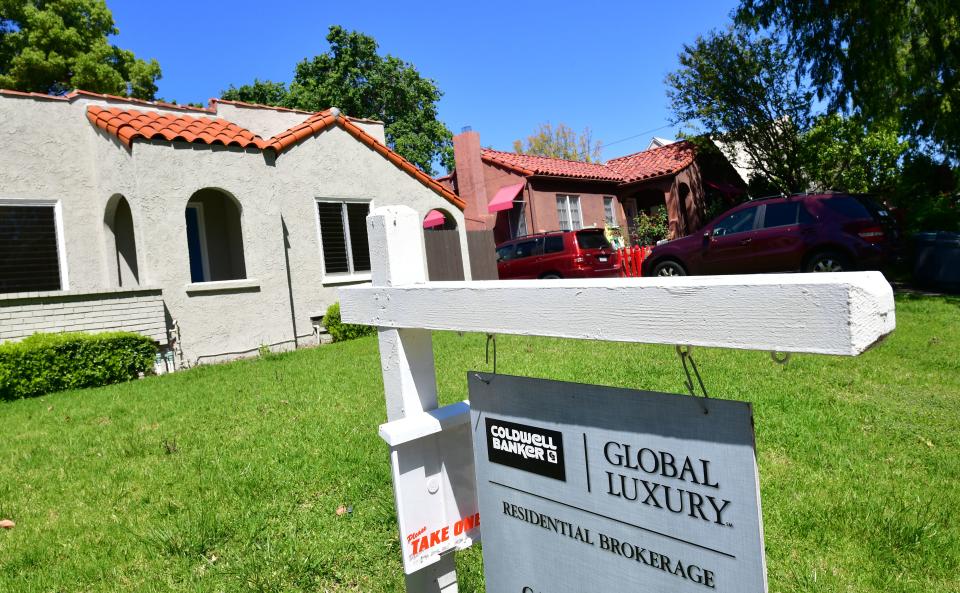Mortgage app surge suggests home sales rebound amid pandemic
After five straight weeks of increases in mortgage applications, it appears the housing market could be making a comeback after the coronavirus pandemic stifled home sales activity in early spring.
The volume of purchase applications grew 6% last week versus the previous one, according to the Mortgage Bankers Association. Purchase activity is now just 1.5% off from last year, an improvement over six weeks ago when it was 35% lower than a year ago.
Read more: ‘No reason to touch anything:’ The new rules of buying a house in a pandemic
“Government purchase applications are now 5% higher than a year ago, which is an encouraging turnaround after the weakness seen over the past two months,” said Joel Kan, associate vice president of economic and industry forecasting at MBA. “As states gradually reopen and both home buyer and seller activity increases, we will be closely watching to see if these positive trends continue, or if they reflect shorter-term, pent-up demand.”

One big reason the housing market could quickly bounce back is that potential homebuyers were largely spared the worst effects of the government shutdowns to curb the outbreaks.
Lower-earning households who are more likely long-term renters made up the bulk of the layoffs. More than half of renters had lost their jobs during the coronavirus pandemic, according to Avail, a landlord software company.
Read more: Coronavirus: Should you move now that you can work from home?
“We’ve seen companies announce layoffs, but that was skewed towards renters,” said George Raitu, a senior economist at Realtor.com. “We’re seeing, for folks who still have jobs or are able to work remotely, there is an interest in [housing] transactions.”
Where is housing coming back?
California, Washington, and New York — the three states with the earliest COVID-19 cases — again showed week-over-week gains in applications, the MBA found, a good sign for the rest of the country.
“If we look locally at Manhattan in particular, there were 49 contracts signed from May 11 to May 17, which was up 40% from the week prior, the greatest percentage since March 26,” said Garrett Derderian, founder at GS Data Services, a real estate analytics and consulting firm. “This [shows] that agents have been able to show homes again with pent-up demand at a low interest rate.”
States where economies are opening up quicker, such as Florida and Georgia, are also poised to see some of the biggest surges in purchases in coming weeks, Raitu said.
“We’re also seeing this in markets where the local economy favors more remote work or there’s a large concentration of financial services such as Charlotte, North Carolina, and Austin, Texas,” Raitu said.
Zachary Staruch, a managing broker at the Pelican Team Real Estate in Florida, said purchase applications jumped by 20% in the past two weeks alone, with interest mainly coming from those who want to buy a second home.
“It seems it will continue to increase,” Staruch said.
‘Much more diminished access to housing’
Homebuyers still will face headwinds as they get back into the market. On the plus side, interest rates remain near historic lows. The rate for the 30-year fixed mortgage decreased to 3.41% from 3.43%, according to the MBA.
Read more: How to get the best mortgage deal
But as unemployment has skyrocketed in the last eight weeks, large lenders such as JPMorgan Chase have tightened their credit requirements for home loans. Even if home sales rebound strongly later this summer, Raitu expects these requirements will stay put, making it harder for first-time homebuyers to qualify.
“Banks are requiring 700 or above FICO scores and have even shifted to 20% or more down payment, whereas before the average FICO was 650 and down payments for a FHA loan were 3.5%,” he said. “We are already seeing that people have a much more diminished access to housing.”
Dhara Singh is a reporter at Cashay and Yahoo Money. Follow her on Twitter at @Dsinghx.
Read more:
Government relieves homeowner’s biggest worry about forbearance amid pandemic
Delinquent mortgages spike in April amid pandemic, study shows
Americans struggle to tap home equity amid coronavirus pandemic
Read the latest financial and business news from Yahoo Finance and Yahoo Money
Follow Yahoo Finance on Twitter, Facebook, Instagram, Flipboard, SmartNews, LinkedIn, YouTube, and reddit.

 money
money 
